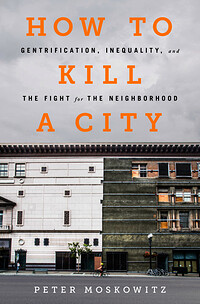Description
A journey to the front lines of the battle for the future of American cities, uncovering the massive, systemic forces behind gentrification--and the lives that are altered in the process. The term gentrification has become a buzzword to describe the changes in urban neighborhoods across the country, but we don't realize just how threatening it is. It means more than the arrival of trendy shops, much-maligned hipsters, and expensive lattes. The very future of American cities as vibrant, equitable spaces hangs in the balance. Peter Moskowitz's How to Kill a City takes readers from the kitchen tables of hurting families who can no longer afford their homes to the corporate boardrooms and political backrooms where destructive housing policies are devised. Along the way, Moskowitz uncovers the massive, systemic forces behind gentrification in New Orleans, Detroit, San Francisco, and New York. The deceptively simple question of who can and cannot afford to pay the rent goes to the heart of America's crises of race and inequality. In the fight for economic opportunity and racial justice, nothing could be more important than housing. A vigorous, hard-hitting expose, How to Kill a City reveals who holds power in our cities-and how we can get it back… (more)
Status
Call number
Publication
User reviews
The political culture in the US means that public authorities are judged primarily by their ability to keep taxes low, so the "successful" mayors are those who get into bed with property developers and replace their housing projects with up-market condos, hotels and conference centres (preferably including monorails or vintage trolleys). If poor people leave the city as a result, who cares? Once they are gone, they don't appear in the statistics any more, and we can save on schools, buses and health care. Moskowitz quotes New Orleans as the most glaring example of this: after hurricane Catrina, thousands of the former (Black) residents who had been displaced from their homes never returned to the city, and no-one made any serious attempt to find out where they had gone and whether they had found anywhere to live and work.
Moskowitz probably isn't the most neutral observer of this kind of process, but he makes a convincing and scary case that something very nasty is going on just out of most of our sight. Even when local people have the skills and experience to resist it, there isn't much hope of stopping it long term, until Americans start running their cities the way Europeans do. Which is unlikely, given the way European cities are going these days. We're more likely to find European mayors talking longingly about the good example of San Francisco...
